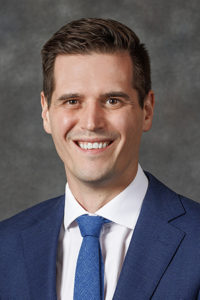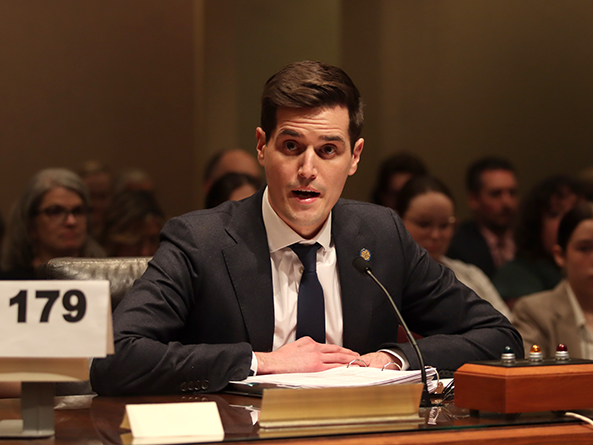Ban on conversion therapy for minors considered
A bill that would ban conversion therapy for minors in Nebraska was heard by the Health and Human Services Committee March 1.

LB179, introduced by Sen. John Fredrickson of Omaha, would prohibit credentialed health care professionals from providing conversion therapy to anyone under the age of 19 in Nebraska. A health care provider who knowingly violates the bill’s provisions would be subject to penalties under the Uniform Deceptive Trade Practices Act.
The bill defines conversion therapy as a practice or treatment that seeks to change an individual’s sexual orientation or gender identity, including efforts to change a person’s gender expression, behavior or sexual or romantic attraction toward individuals of the same gender.
Fredrickson said a study conducted by the Trevor Project found that 10 percent of LGBTQ youth in Nebraska were threatened with conversion therapy and seven percent reported being subjected to the practice.
That same study reported 50 percent of LGBTQ youth in Nebraska had considered suicide over the last year, he said, with 15 percent reporting an attempt.
“LGBTQ folks are not genetically predisposed to suicide,” Fredrickson said. “These harrowing statistics are the result of environmental factors, including societal stigma and shaming such as that perpetuated through conversion therapy.”
LB179 also would prohibit the use of state funds for conversion therapy.
The ban would not apply to a clergy member or religious counselor providing conversion therapy in a pastoral capacity rather than as a health care provider.
Testifying in support of the bill on behalf of the Nebraska Association for Marriage and Family Therapy was Anne Buettner. She said the association joins every major mental health organization — including but not limited to the American Association for Marriage and Family Therapy, American Counseling Association and National Association of Social Workers — in denouncing the practice of conversion therapy.
“Scientific studies have found negative effects associated with conversion therapy including increased levels of depression, suicidal thoughts, suicidal attempts and substance abuse in adults,” Buettner said. “Conversion therapy is mental health malpractice.”
Proponent Adam Witte said he sought treatment when he was 16 due to fear of disappointing his parents and church community by coming out as gay. Witte said his fear of discovery won over the receptionist at the treatment facility and she waived the parental authorization form.
Afraid of his parents asking too many questions, Witte said he scheduled sessions during the facility’s overnight hours. While many students sneak out of the house at night to cause trouble, Witte said, he snuck out twice a week for 15 months to subject himself to electric shock aversion therapy.
“I was the poster child for someone this treatment should have worked on; I wanted nothing more in the world than for it to work — and it didn’t,” Witte said.
Courtney Yoachim, a licensed professional counselor, also testified in support of LB179. Current standards used to guide professional practice for trans and gender diverse individuals state that treatment aimed at trying to change a person’s gender identity, expression or sexual orientation is no longer considered ethical, she said.
“I cannot provide any treatment known through research to cause harm,” Yoachim said, “and conversion therapy has been shown to be harmful.”
Testifying in opposition on behalf of the Alliance Defending Freedom was Greg Baylor. Every person deserves the right to a relationship with a counselor of their choosing, he said, free from government censorship.
“LB179 allows government officials to insert themselves into the private conversations between patients and clients to decide what goals can be pursued and what ideas can be discussed,” Baylor said. “The government cannot prohibit conversations between a therapist and client based solely on the content of that conversation.”
Tom Venzor, representing the Nebraska Catholic Conference, also testified in opposition. He said the religious exemption outlined in the bill would not sufficiently protect individuals who offer counseling services in both religious and professional settings.
Forcing a separation between pastoral or religious values and health care is problematic, Venzor said, especially when a patient is seeking a mental health professional who shares their moral and religious values.
“[LB179] would force health care professionals who are clergy members or religious counselors … to check their religious and moral values at the door,” he said. “This treats pastoral and religious considerations as having no bearing on the overall well-being and health of a client.”
Patricia Bartels also spoke in opposition to the bill, saying it would require counselors to follow the affirmative model of therapy. If a counselor can only agree with a patient’s perspective, she said, they may not gain the feedback necessary to make an informed decision.
“These [patients] need to have the ability to have both sides of the argument presented to them,” Bartels said.
The committee took no immediate action on LB179.


